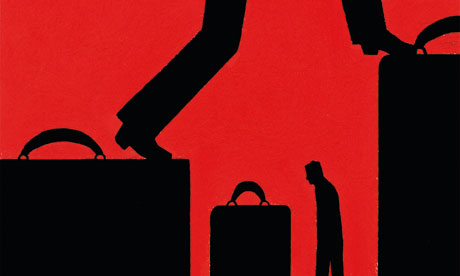
Unless you're a better person than me – and I reluctantly concede such people may exist – there are probably several things on your to-do list, or on your mind, that you feel guilty about not having got around to yet. This kind of low-level, everyday guilt poses a puzzle. It arises, obviously, because of a gap between what you believe you should have done and what you've actually done; were we perfectly rational creatures, feeling that negative emotion would motivate us to close the gap. In the real world, though, the easiest way not to feel the guilt is often just to focus on something else. Ladies and gentlemen, I give you… procrastination! Perhaps you're already acquainted?
To avoid the unpleasant guilt, you avoid the guilt-triggering task. That triggers more guilt, thus more avoidance, and so on. You're overdue, for example, to write to a faraway friend, but you put it off, because you want to give the task the attention it deserves. Then the guilt-avoidance cycle kicks in. Before you know it, a month's gone by, and someone you especially wanted to contact is getting the silent treatment – not despite but because of how important you felt it was to get in touch. In the technical language of psychology, this is really sodding annoying.
Naturally, then, I was intrigued a few weeks back when the New York-based creative consultant Nick Jehlen wrote of his firm's experiences with a weekly Guilt Hour, dedicated specifically to those nagging, uncompleted jobs. "Every Wednesday at 10am, we sit together and look at our task lists [and] identify the one thing we feel most guilty about not having done yet," he explained. "Then we go around the table and name our One Guilty Task, and commit to spending the rest of Guilt Hour working on it." Done collectively, I suspect, there's a cathartic group-therapy aspect to this. Even as a solo worker, though, I can report – based on my own recent experiments – that Guilt Hour is remarkably effective. Except once, when I realised there was nothing I felt guilty for leaving undone. That time was even better.
Superficially, the merits of Guilt Hour are straightforward: guilt feels bad, so address the cause of the guilt and you'll feel better. But there's something deeper going on. Resistance, as the time-management coach Mark Forster has written, serves as a signal: it tends to attach itself to stuff that really matters. Attack your most guilt-inducing tasks, and you may find, without intending it, that you've attacked the most important ones too. Guilt Hour thus belongs to that family of productivity techniques that seek to co-opt resistance. Another is to spend an hour or two alternating between the most and least enticing items on your to-do list, then the next most and least enticing, and so on, each time sugaring the pill of an important task with a pleasant one. (Scheduling things like Guilt Hour in advance helps greatly, as well: you'll be much more likely actually to do them.)
This back-to-front approach to productivity – finding what matters most by asking what's least appealing – can certainly be taken too far. Guilt has plenty of other causes. And many tasks cause unpleasant emotions simply because they're unpleasant. But "true guilt", as RD Laing put it, "is guilt at the obligation one owes to oneself to be oneself" – and that's the kind worth heeding.
oliver.burkeman@theguardian.com
Follow Oliver on Twitter.

